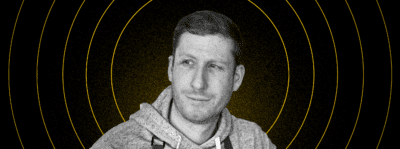Karma Policeman: How Jon Ronson Became the Internet’s Conscience
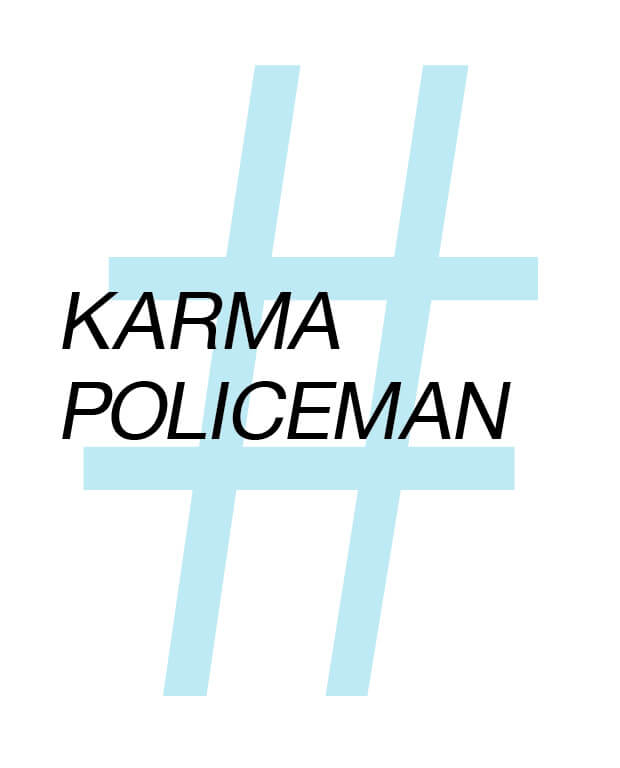
How Jon Ronson became
the Internet’s conscience
One morning this summer, the Welsh author Jon Ronson found himself baffled by something he ran across in The Guardian. The piece was under the headline “Civil rights activist Rachel Dolezal misrepresented herself as black, claim parents.”
“I had a thousand questions,” he told me. “Does she feel about race the way some transgender people feel about gender? Or maybe not! I don’t know, that’s sort of out of my sphere of understanding. Is she mentally ill; is she troubled?” He wanted to see how his peers were reacting to the story. “I thought, I wonder what Twitter’s thinking.”
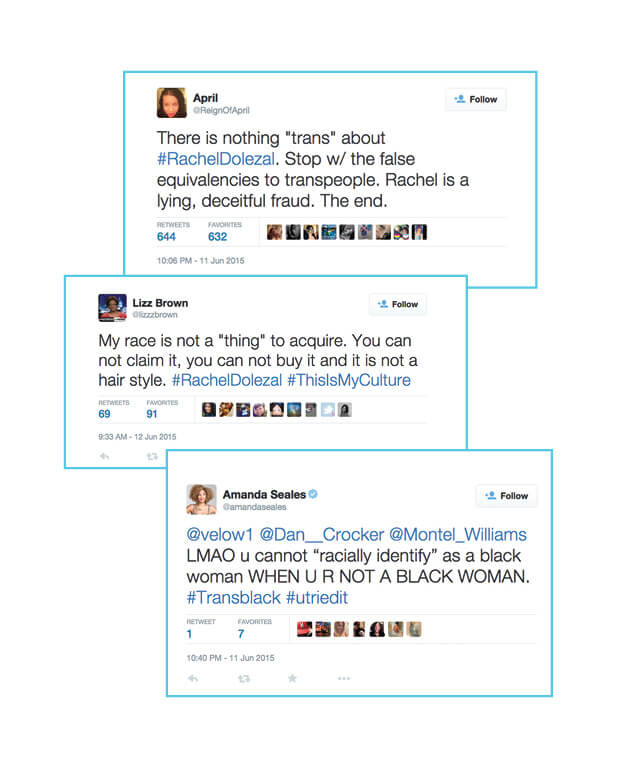

“All I saw there was, once again, total instant judgment and condemnation,” he told me on a recent afternoon. “She’s a racist! She’s Nike appropriating hip-hop culture to sell sneakers. Which so fucking obviously she’s not. I mean, it’s so obvious that it’s more complicated than that. And I just felt this kind of flash of rage. . . I just thought, you know, I’m fucking sick of this.”
At that point, Ronson had been bathing in Internet outrage for several years. His latest book, So You’ve Been Publicly Shamed (which reached #12 on the New York Times bestseller list), investigated people who had their lives ruined by strangers on Twitter. Since its publication, he’d been unable to let the subject go.
“When I did the Weavers, the family from Ruby Ridge, in my book Them, which is one of the saddest stories I’ve ever done, I didn’t get upset, making that film or writing that story,” he said, referring to the family living in the Idaho woods who were ambushed by federal agents and killed. “I just went back and carried on with my life in London. That’s what normally happens if I’m telling a really awful, tragic story. But with this particular subject matter, it became way more personal and way more emotional to me than any story I’ve ever done before.”
So, on that day this summer, he decided to weigh in with a tweet of his own.
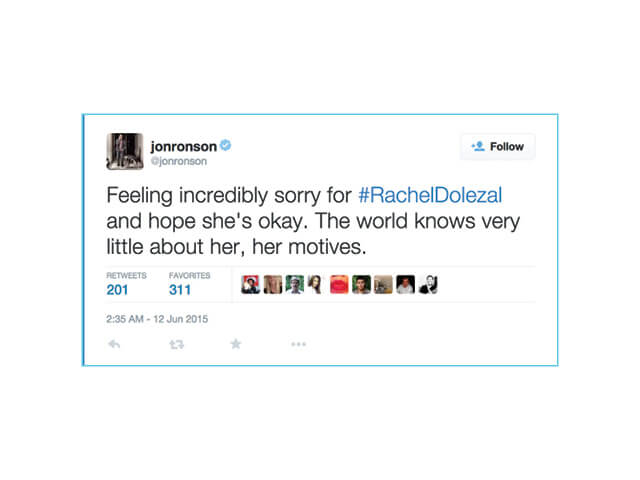

In retrospect, it was an innocuous, non-confrontational message. But in the charged atmosphere of that day, it was something akin to asking people to think of the hijacker’s families on 9/11. Ronson’s audience, at the time just north of 100,000 followers, did not react well. “It was like the scene in Poltergeist when they open the door and everything starts spinning around. It was brutal,” Ronson said. He argued with virtually everyone who argued with him, sending out 178 tweets that day, an average of one nearly every five minutes for 16 hours straight.
This was not new territory. Little more than a week before, Ronson had waded into a controversy about an SUV driver who was being attacked online for a video showing him terrorizing a cyclist, eventually writing, “Look—I know the reality of social media shamings. They’re not the answer.” Ronson was hard at work shouting into the void for Twitter to play nice.
Jon Ronson is one of New York’s more immediately identifiable literary nerds. The author of nine books (one of them, The Men Who Stare at Goats, was turned into a 2009 film starring George Clooney and Ewan McGregor), countless magazine and newspaper articles, the host of 17 television documentaries in his native Britain, and the voice behind a dozen This American Life stories, Ronson is that increasingly rare creature: a celebrity author.
“He’s a very hard worker,” said Maeve Higgins, an Irish comedian who co-hosts his monthly Union Hall comedy and storytelling show, “I’m New Here–Can You Show Me Around?” “He’s always like, after this I’ll take a break. After this tour is over, I’ll be around more to hang out. But he’s not around, because he’s working.” He is relentlessly dedicated, she explained. “Sometimes we write together, which is really good for me, and useful. I’ll say, oh, I’m really busy the next few days so I can’t really do it, and he’ll say, let’s just do two pages.”
Ronson looks the same whether he’s in a documentary for The Guardian, a press photo, appearing on stage every month at Union Hall, or striding towards you in a small Park Slope coffee shop, backpack dangling from one arm. Smallish in stature, he has short but wildly uncontrolled hair and large, circular glasses with stark black frames that give him the slightly manic curiosity of a cartoon animal. At a recent stage appearance, he showed off a photo of himself hugging a koala bear that didn’t look unlike the reunion of two long-lost relatives. In many photos (and the two times I met with him in person), he’s wearing what appears to be the same gray hoodie.
“He has a number of the same clothes, I think?” said Higgins. “Like the way Kate Moss has her Paris apartment and her New York apartment, and the same clothes at both of them. But, you know, I actually don’t know if he does, or if it’s the same hoodie.”
Then there’s his voice. It’s a kind of super Welsh accent: breathy, rolling, and dropping, putting casually strong emphasis on a sentence’s key words. It’s impossible to listen to him talk and not begin to hear his voice over and over in your head, especially when reading his work.
In his books and radio programs, Ronson presents himself as a worried, self-recriminating person possessed of compulsive sympathy for other people, especially those on the fringes of society. In his pre-9/11 book Them, he profiles extremists of various stripes in a surprisingly human way, chronicling the internal tensions of an effort to rebrand the KKK, the tragicomedy of far right-wing host Alex Jones trying to infiltrate a meeting of the Bilderberg Group (a secret cabal supposedly in control of the world), and the everyday struggles of a Muslim extremist, Omar Bakri. In one memorable mashup of the quotidian and the extreme, Bakri has Ronson drive him to a Cash and Carry where he buys several large novelty Coca-Cola bottles he can use to collect donations to support terrorist organizations.
Ronson is basically the same in person as in his books. Before he’d even sat down at our meeting, he began intensely questioning me about the show of his I’d seen a few days prior.
“Did you think it went on a little long?” he said, headphones sill dangling around his neck. “I did. It was slightly overbooked, and shows like that should never last more than two hours. . . I obsess over this. Like, I’m quite a nightmare backstage–nobody should go over 10 minutes. Everyone always says they won’t go over 10 minutes, but then everyone always goes over 10 minutes.” Only with this off his chest did he walk over to the counter and order an iced coffee and a kale muffin, which he ate most of before wrapping the leftovers in its cellophane. He spent the next hour squeezing it like a makeshift stress ball. By the end of our conversation, it was a perfect gray sphere.
“I don’t go into situations to condemn people,
I go into situations to try and understand.”
Outrage has ESSENTIALLY become the reason people go on social media. We are outraged at racism, sexism, climate change, and deniers thereof, efforts to defund Planned Parenthood, on and on. Taking part in Internet outrage can feel like doing real work. The week of this writing, the Internet is outraged on behalf of a female rock star who suffered a poor review she’s cast as sexism. It’s furious at an otherwise likable movie star who’s suddenly found his every comment projected as sexism or racism following a right-headed speech on a reality show that he delivered to the wrong target. And it’s angry about gun control laws after a mass shooting.
All of these issues–murder, sexism, and racism–more or less seem worth getting mad about. What’s more, they reflect the views and concerns of the great mass of people, and not the financial or political elites. Ronson was an early proponent of social media for just this reason. “I saw it as such an exciting opportunity. I felt sort of personally invested in it, in a sort of egalitarian way,” he told me. Early in his latest book, he calls these online outrages–which he mostly refers to as Twitter shamings after his social network of choice–the “democratization of justice.”
So… chronicles Ronson’s change of heart. He came to see the shaming of wrongdoers on Twitter less as citizen justice and more like vigilantism. Or like the French Revolution’s Reign of Terror: a society with a well-oiled apparatus for public execution but not enough deserving targets. So the standards of what’s “wrong” and deserving of the harshest punishment gradually go lower and lower. His book focuses on the seemingly minor offenses that resulted in major Twitter attacks.
There’s Justine Sacco, who tweeted “Going to Africa. Hope I don’t get AIDS. Just kidding. I’m white!” There are the two men who joked to each other about “forking” and “dongles” at a web developer conference and had their photos taken by a woman sitting near them who found their jokes offensive. Everyone involved was subjected to intense online hate, and all eventually lost their jobs. There’s Lindsey Stone, a woman who posted a picture of herself yelling at and flipping off a sign at Arlington National Cemetery that read “SILENCE and RESPECT,” and became an avatar of everything wrong with young people in Obama’s America for the conservative Internet.
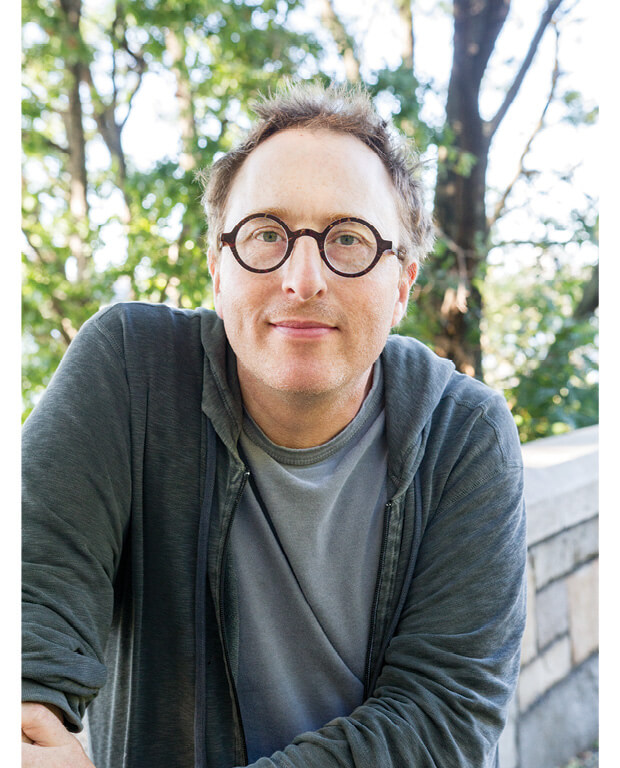

photo by Jane Bruce
There’s also plenty of shamings in the book that take place offline (or at least mostly off): disgraced journalist Jonah Lehrer, disgraced storyteller Mike Daisey, disgraced small-town men and women revealed to have been visiting a local prostitute, disgraced New Jersey governor Jim McGreevey, on and on.
Towards the end of the book, Ronson introduces James Gilligan, a psychiatrist who works with violent criminals in Massachusetts. His clients are the type of extremely violent offenders who murder people in jail while awaiting trial for murder. “I have yet to see a serious act of violence that was not provoked by the experience of feeling shamed or humiliated, disrespected and ridiculed,” he quotes Gilligan as saying. Later, Ronson quotes from one of Gilligan’s books, Violence: Reflections on Our Deadliest Epidemic: “Shame, like cold, is, in essence, the absence of warmth. And when it reaches overwhelming intensity, shame is experienced, like cold, as a feeling of numbness and deadness. [In Dante’s Inferno] the lowest circle of hell was a region not of flames, but of ice–absolute coldness.”
“Those murderers in the maximum security prison in Massachusetts talking about these emotional switches clicking off in them,” Ronson told me, “that this happens to you psychologically in the light of a shaming. And of course what happened to Jonah [Lehrer] is way less bad than what happened to these murderers in Massachusetts, but the fact that you hear these kind of echoes–I had to turn off some emotional switch in me, I had to shut down.” The overall impression the book leaves you with is that shame is a devastating emotion, and that we should never knowingly inflict it on another person.
Several times during our conversation, he mentions a quote from the writer Meghan O’Gieblyn, who wrote about So… for Boston Review, a quote he slightly misremembers as, “There’s social justice, and there’s cathartic alternatives to social justice.” Shaming, he says, is always the latter and never the former.
But is this true? If Facebook, Twitter, and a thicket of messaging apps are becoming one of the major ways that human beings communicate with each other, then doesn’t the way we communicate with each other on those platforms matter? Isn’t it worth fighting about, if only within those platforms themselves?
“Sometimes people should run into giant walls of aggression,” said Choire Sicha, who reviewed So… for the New York Times. “Like I do think that men who are acting stupid should get, like, their faces torn off. You know what I mean? Like, go ahead. Go to town. It’s not going to do any better for the world, necessarily, but it’s not going to make it any worse, necessarily.”
“What I’ve learned over 30 years is that
compassion and empathy are better than
instant judgment and condemnation.”
Ronson’s book has a complete lack of comment (judgment, one could say) on the actual things that individuals he meets have done to bring Internet outrage upon themselves. Ronson speaks of Internet shame like a beast lurking in the jungle, ready to pounce. Some days it can certainly seem like this. However, it’s a fact that each of these people did something considered stupid and unwise to bring this reaction down on him or herself. Even Ronson’s favorite case, Justine Sacco, isn’t entirely blameless. Simply saying, “I didn’t mean to be racist!” isn’t really a defense if thousands of people deem what you said to be racist.
For all of its charm, this complete lack of acknowledgment of relatively basic facts of right and wrong is an issue with much of Ronson’s writing. Do we really want a funny, humanizing take on Islamic terrorists or the KKK? Perhaps it’s for the best if we don’t see the world from their points of view.
“I’ve been doing this for 30 years, so this is my life’s work,” Ronson said. “That’s why I wrote this book. Nothing to do with gender or race. It’s because I’m deeply steeped in that–in spiraling, damaged people. And their relationship with us and how we should deal with them. What I’ve learned over 30 years is that compassion and empathy are better than instant judgment and condemnation.” Later, he explains his general approach: “I don’t go into situations to condemn people; I go into situations to try and understand.”
He carries this mission–of understanding and sympathy–into his online interactions. And for the holes in his argument, it’s hard not to be on his side. Shame is terrible, and no one wants to be its intended target.
“He’s not wrong for the most part,” said Sicha. “He’s literally going to tweet that a thousand times. Be nice to people. Be nice to people. And you know what? It makes me want to be mean to him a little bit, but I’m not going to because, like, I’m going to take his advice and his advice is essentially correct.”
For all of his empathy and humanity, Ronson’s worldview is unavoidably tainted by three decades of fame and fortune. He obviously has an easier time sympathizing with people who accidentally say something racist or sexist than with anyone who is the victim of racism or sexism. An uncharitable reading of Ronson’s book would cast him as the guy who pipes up after a racist joke to say, “Aw, come on, he didn’t mean it like that,” without really knowing how the person meant it. A story he told me about the aftermath of his Dolezal tweet was unintentionally revealing.
“A couple of days later I went to London to do a TEDGlobal talk. And the night before–and I mentioned this at the end of the TED talk, actually–the night before, we all went for dinner. We were talking, and it was all very nice. I checked Twitter, and the first thing I saw was ‘Jon Ronson’s a white supremacist.’ And then I went back to the dinner table and everyone was being nice, and it just hit me… that is the opposite of the world we should be wanting to build for ourselves.”
Sure, given the choice I think most people would rather live in a world in which you’re having a polite dinner before you give a speech to a rapt international audience rather than one in which you’re angry at strangers on Twitter. But then, most people don’t have that option.
After a long summer of defending the worst of the worst on the Internet–including Dolezal, and even words qualified as support for Walter Palmer, the American dentist who killed Cecil the Lion (“I won’t say, ‘Yay! Let’s destroy the lion killer!’ because shamings have their own problems, but big game hunting is horrific, and . . .” read one message)–Ronson has grown tired of being the Internet’s niceness police.
“Since Rachel Dolezal, I’ve barely done it,” he told me. “I think for a number of reasons. In part because I don’t want to be a caricature; I don’t want to be a meme. I have no interest in being a meme. It’s unseemly.” Of course, he hasn’t entirely been able to quit Twitter. He’s still there, defending new Labour leader Jeremy Corbyn, and talking about Peeple, a new app which supposedly allows people to write ratings of each other which will live forever online. “Peeple sounds like the most horrific idea ever,” Ronson tweeted in early October. “Tho I notice that some of the people criticizing it do the exact same brutal shit right here.” ♦
You might also like 














